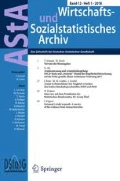Zusammenfassung
Vergleicht man akademische Spinoff-Gründungen mit anderen forschungs- und wissensintensiven Gründungen, zeigt sich, dass Spinoff-Gründungen signifikant forschungs- und wissenschaftsorientierter sind. Dies drückt sich in höherer Forschungsintensität, höherer Patentierneigung und intensiveren Kontakten zur Wissenschaft aus. Spinoff-Gründungen besetzen ein besonders forschungsintensives Segment innerhalb der forschungs- und wissensintensiven Branchen und stellen eine Verbindung zwischen Wissenschaft und Markt her. In diesemPapier wird für Österreich untersucht, ob sich die Performance von Spinoff-Gründungen von der anderer Gründungen in den forschungs- und wissensintensiven Wirtschaftszweigen unterscheidet. Ökonometrische Modellrechnungen zeigen, dass Spinoff-Gründungen hinsichtlich Umsatz- und Beschäftigungswachstum nicht erfolgreicher sind als andere Gründungen in den forschungs- und wissensintensiven Branchen.
Abstract
When academic spin-offs are compared with other research- and knowledge-intensive start-ups, it is apparent that spin-offs are significantly more research- and knowledge-oriented than other start-ups. This fact becomes evident in higher research intensity, higher inclination to patenting and more intensive contacts to science. Spin-offs fill a particularly research-intensive segment within the research- and knowledge-intensive sectors and establish a connection between science and market. In this paper, for Austria, it is investigated if the performance of spin-offs differs form that of other research- and knowledge-intensive start-ups. Econometric model calculations show that spin-offs are as for turnover and employment growth not more successful than other start-ups in the research- and knowledge-intensive sector.
Literatur
Cochran WG, Rubin DB (1973) Controlling bias in observational studie: a review. Sankhya Ser A 35:417–446
Egeln J, Gassler H, Gretzmacher N, Gottschalk S, Metzger G, Rammer Ch (2004) Akademische Spinoff-Gründungen in Österreich. Im Auftrag des Bundesministeriums für Verkehr, Innovation und Technologie
Egeln J, Gottschalk S, Rammer Ch, Spielkamp A (2003) Spinoff-Gründungen aus der öffentlichen Forschung in Deutschland. ZEW Wirtschaftsanalysen, Schriftenreihe des ZEW, Bd. 68
Grupp H, Jungmittag A, Schmoch U, Legler H (2000) Hochtechnologie 2000: Neudefinition der Hochtechnologie für die Berichterstattung zur technologischen Leistungsfähigkeit Deutschlands. Fraunhofer ISI, Karlsruhe
Kenney M (1986) Biotechnology: The University-Industrial Complex. New Haven, CT, London
Lacetera N (2006) Academic Entrepreneurship. Manage Sci (im Druck)
Nerkar A, Shane S (2003) When do start-ups that exploit patented academic knowledge survive? Int J Ind Org 21:1391–1410
Rosenbaum PR, Rubin DB (1985) Constructing a control group using multivariate matched sampling methods that incorporate the propensity score. Am Stat Assoc 39(1):33–38
Rothaermel FT, Thursby M (2005) University-incubator firm knowledge flows: assessing their impact on incubator firm performance. Res Pol 34:305–320
Roy AD (1951) Some thoughts on the distribution of earnings. Oxford Econ Pap 3:135–146
Rubin DB (1974) Estimation causal effects of treatments in randomized and nonrandomized studies. J Educ Psychol 66(5):688–701
Rubin DB (1976) Matching methods that are equal percent bias reducing: some examples. Biometrics 32:109–120
Shane S, Stuart T (2002) Organizational endowments and the performance of university start-ups. Manage Sci 48(1):154–170
Torero M, Darby M, Zucker L (2001) The Importance of Intellectual Human Capital in the Birth of the Semiconductor Industry. Working Paper
Zucker LG, Darbs MR (1995) Virtuous Circles of Productivity: Star Bioscientists and the Institutional Transformation of Industry. National Bureau of Economic Research, Inc, NBER Working Papers: 5342
Author information
Authors and Affiliations
Corresponding author
Rights and permissions
About this article
Cite this article
Egeln, J., Fryges, H., Gottschalk, S. et al. Performance von akademischen Spinoff-Gründungen in Österreich . AStA Wirtsch Sozialstat Arch 3, 265–283 (2009). https://doi.org/10.1007/s11943-009-0072-0
Received:
Accepted:
Published:
Issue Date:
DOI: https://doi.org/10.1007/s11943-009-0072-0

